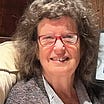Photo by Nadim Merrikh on Unsplash
At Lake Bde Maka Ska, life unfolds before your eyes like an old newsreel. It walks, runs, plays volleyball, flies, swims, cycles, roller skates, kayaks, and sails. I enjoy strolling along the path with the walkers and runners, watching the array of people at the lake moving by at varying speeds, dressed in an assortment of outfits, some covered from head to toe and some almost naked.
Frank and I walk for a while, then notice a very welcoming bench just at the water’s edge. We stop to watch the duck families and the solitary kayakers mimicking them, gliding by beyond the screen of reeds. After some time, the kayakers appear to be calling a meeting. Six or eight of them congregate in the middle of the lake. I wonder what they’re talking about. I wonder if they know each other or whether this is just something kayakers do to connect with other people whose way in the world involves skimming the surface of the water. Certainly, they are a different species from the heavy breathers pounding the path with their running shoes and spraying it with their sweat.
I do not cycle or kayak or play volleyball. I like to sit on the bench in my characteristic witnessing posture, taking in the scene at the lake, thinking of it as a snapshot, a thumbnail sketch of all that is. Everything comes and goes.
I’m remembering my old college friend, at one time as close as a second skin, now hovering over Brooklyn and Vermont like something out of a Chagall painting. I feel strangely at peace with his death in a way I did not feel seventeen years ago when my mother went and died in California without inviting me. I’ve learned somehow to let people go when and where they choose to go. Somehow the very fact of my long-ago familiarity with my old friend—familiarity in the sense of being family—makes his moving on to a dimension he categorically did not believe in seem credible.
If I know anything, I know where he’s at. He’s out there with the ducks.
A young man I met the day he was born is preparing to become a father. I knew all four of his grandparents. The arrival of a new generation is an occasion for celebration in those families that can afford to feed and nurture the new baby. It’s evidence that life goes on even in this world that sometimes seems quite literally God-forsaken. I use the word God advisedly because I know it doesn’t resonate with everyone and even for those for whom it trips off the tongue, it may mean something different to each of them.
For me, the world is always sanctified even when, or especially when, it is feeling sickly and out of sorts. Even when it needs our help so desperately. When the sky is filled with faraway wildfire smoke, when the rain never comes, the world suffers and suffering calls forth my inquiry and my compassion. I want to sit by its bedside the way I sit by the lake. I want the small children to climb over the railings and get under the covers bringing a smile to the world’s face the way my son did when my father was dying in his hospital bed on 83rd Street. Bringing new life into the world is an act of extraordinary magnanimity, of courage and generosity.
Lately, it has occurred to me that I want to hold the world’s hand by meeting up with it as often as I can and as deeply as I can in the time I have left. It may be twenty years. It may be twenty minutes. By meeting up with the world, I mean seeing it clearly as it is and marvelling at it.
This can take many forms. Last night in the park behind my son’s house, we were treated to spectacular dry lightning that went on for at least an hour, filling the sky with illumination and a disco-worthy electric display of crooked fingers of light crackling over a huge expanse with no rain at all and only occasional muted thunder.
Then came the Bloomington fireworks. As soon as the man-made pyrotechnics began, the lightning stopped as if to say, “Your turn. Let’s see what you’ve got.” And Frank and I and my son and daughter-in-law and her brother and my two grandsons lifted our faces to the sky and shared our flesh with the mosquitoes and it was evening and it was morning. Independence Day.







You write like the kind of person whose hands would be good ones to hold onto. Thank you.
Susie, You’ve done it again--made the seemingly ordinary, sacred! I love your writing and subscribe to “seventysomething”.